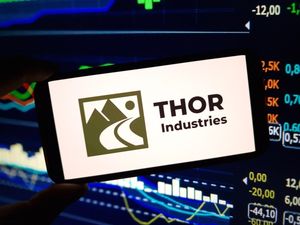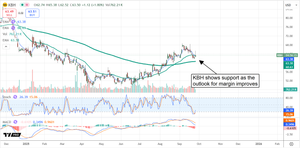
Low-volatility stocks may offer stability, but that often comes at the cost of slower growth and the upside potential of more dynamic companies.
Finding the right balance between safety and returns isn’t easy, which is why StockStory is here to help. Keeping that in mind, here are three low-volatility stocks that don’t make the cut and some better opportunities instead.
General Mills (GIS)
Rolling One-Year Beta: 0.06
Best known for its portfolio of powerhouse breakfast cereal brands, General Mills (NYSE: GIS) is a packaged foods company that has also made a mark in cereals, baking products, and snacks.
Why Does GIS Give Us Pause?
- Falling unit sales over the past two years imply it may need to invest in product improvements to get back on track
- Estimated sales decline of 3.2% for the next 12 months implies an even more challenging demand environment
- 3.1 percentage point decline in its free cash flow margin over the last year reflects the company’s increased investments to defend its market position
General Mills is trading at $50.51 per share, or 13.6x forward P/E. If you’re considering GIS for your portfolio, see our FREE research report to learn more.
Acushnet (GOLF)
Rolling One-Year Beta: 0.95
Producer of the acclaimed Titleist Pro V1 golf ball, Acushnet (NYSE: GOLF) is a design and manufacturing company specializing in performance-driven golf products.
Why Are We Wary of GOLF?
- 2.2% annual revenue growth over the last two years was slower than its consumer discretionary peers
- Estimated sales growth of 1.1% for the next 12 months is soft and implies weaker demand
- Shrinking returns on capital suggest that increasing competition is eating into the company’s profitability
Acushnet’s stock price of $75.21 implies a valuation ratio of 19.9x forward P/E. Dive into our free research report to see why there are better opportunities than GOLF.
Prospect Capital (PSEC)
Rolling One-Year Beta: 0.62
Operating as one of the largest publicly traded business development companies in the United States, Prospect Capital (NASDAQ: PSEC) provides debt and equity financing to middle-market companies across various industries.
Why Do We Pass on PSEC?
- Annual sales declines of 8.1% for the past two years show its products and services struggled to connect with the market during this cycle
- Earnings per share decreased by more than its revenue over the last two years, showing each sale was less profitable
- Annual tangible book value per share declines of 4.3% for the past five years show its capital management struggled during this cycle
At $2.59 per share, Prospect Capital trades at 5.5x forward P/E. To fully understand why you should be careful with PSEC, check out our full research report (it’s free).
Stocks We Like More
Trump’s April 2025 tariff bombshell triggered a massive market selloff, but stocks have since staged an impressive recovery, leaving those who panic sold on the sidelines.
Take advantage of the rebound by checking out our Top 6 Stocks for this week. This is a curated list of our High Quality stocks that have generated a market-beating return of 183% over the last five years (as of March 31st 2025).
Stocks that made our list in 2020 include now familiar names such as Nvidia (+1,545% between March 2020 and March 2025) as well as under-the-radar businesses like the once-small-cap company Comfort Systems (+782% five-year return). Find your next big winner with StockStory today for free. Find your next big winner with StockStory today. Find your next big winner with StockStory today
StockStory is growing and hiring equity analyst and marketing roles. Are you a 0 to 1 builder passionate about the markets and AI? See the open roles here.





